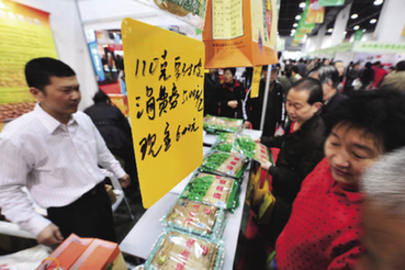|
Popularizing Coupons Nationwide?
Issuing consumption coupons is one of the economic policy tools to stimulate consumption. When economic depression causes people's consumption capability to decline, the government issues consumption coupons to be used as an instrument of payment, hoping to revitalize consumption through increasing people's purchasing power and consumption desire, so as to promote production and investment activities and speed up recovery of the economy.
Liu Hanyuan, a member of the Standing Committee of the National Committee of the Chinese People's Political Consultative Conference (CPPCC), was the first to advocate the issuing of consumption coupons among the populace. He said, "Consumption coupons give consumers greater payment ability and enable them to turn consumption desire into purchasing behavior, hence accelerating the recovery of consumption confidence and ability, and expanding domestic demand immediately. Manufacturing and processing enterprises especially gain more income and profit, and so invest more in production, directly promoting employment and increasing governmental tax income. This creates a cycle that will bring China's economy back on the fast track of development."
During the 2009 session of the Chinese People's Political Consultative Conference in March, Liu Hanyuan presented an overture entitled "Effectively Generating Short-term Domestic Demand Through Issuing Consumption Coupons." He suggested that to effectively boost people's confidence in consumption, the government issue consumption coupons worth RMB 1,000 to every Chinese citizen, in four batches. He believes this is the most direct and effective way to stimulate consumption.
Liu Hanyuan drew inspiration from the experiences of Singapore, Japan and China's Hong Kong, Macao and Taiwan, whose "red packets" have an instant effect on consumption.
Will consumption coupons be popularized nationwide? Chen Deming, minister of Commerce, said that the ministry would track the effects of consumption coupons. The central authorities are studying the feasibility of issuing nationwide consumption coupons, hoping to stimulate people's purchasing desire, revitalize tourism and alleviate pressure on people who have difficulties in their lives. Policy readjustments will be made after an evaluation.
 |
|
On March 20, 2009, Hangzhou City issued a second batch of consumption coupons and started a four-day commodities fair. |
Solving Difficulties Through Development
Figures from the National Statistical Bureau show that the Consumer Confidence Index in China has been in decline since January 2008. According to Nielsen data, more than 60 percent of the populace believes that income levels will be the key factor limiting consumption in 2009. With domestic enterprises' decline in economic performance, their ability to invest and expand has been affected, resulting in a reduction in supply and rising prices. This in turn will make consumption shrink further, forming a vicious circle.
"Only by solving the present problem of low consumption in the coming six months to a year, and by expanding domestic consumption, will the RMB 4 trillion investment be sustainable, and bring its multiplier effect to full play," said Liu Hanyuan.
"At present, various localities are issuing consumption coupons and tourism coupons on a trial basis. I think all these can be tried," said Huang Qingyong, a member of the National Committee of the CPPCC and deputy secretary general of the Guangdong Provincial Committee of the CPPCC. The aim of issuing consumption coupons, tourism coupons and car coupons is to boost people's consumption confidence, so that people are willing to spend money.
"Issuing consumption coupons is a special means adopted in a special period, not a long-term policy," said Cai Qi, mayor of Hangzhou City and a deputy to the National People's Congress. Using consumption coupons aims to make use of their multiplier effect and promote consumption. It is not a form of protectionism. After all they make up only a tiny share.
Cai Qi said that issuing consumption coupons is an effective way of expanding local consumption. According to calculations, when retail sales of Hangzhou's consumables increase one percent, it brings an increase of 0.56 percentage points in local GDP.
Cai Qi also said that issuing consumption coupons is only the beginning of stimulating consumption and expanding domestic demand, and that the ultimate solution to various problems is dependant on development. "To develop, we rely on industry and services. It is right to promote investment and consumption, but what is more important is to rely on enterprises, which constitute the main force of the market in coping with the challenges of the financial crisis. At this moment, the government should stand together with enterprises to bridge difficulties."
| 